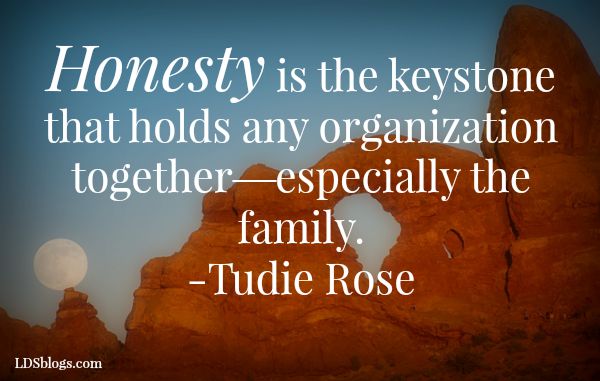Leadership—of the family, an organization, our society, or even the nation—erodes and eventually falls apart without honesty and integrity. Honesty is the keystone that holds any organization together. — President Gordon B. Hinckley, Stand A Little Taller, Eagle Gate (2001).
I’ve had the opportunity in my lifetime to work in a variety of offices. Most of my experiences were wonderful, a few mediocre, and a couple were torturous. There was an obvious correlation between employee morale and the honesty of the employer and/or supervisors. People enjoy their jobs when they feel they are working for honest people who tell the truth. It’s as simple as that.
 Employees not only want their employers and supervisors to be honest with them, but also with their clients or customers. No one likes to hear their employer lie to a client, or treat the customer with anything less than stellar integrity. When the boss is not honest with the client, he or she smudges the integrity of all who work in the company.
Employees not only want their employers and supervisors to be honest with them, but also with their clients or customers. No one likes to hear their employer lie to a client, or treat the customer with anything less than stellar integrity. When the boss is not honest with the client, he or she smudges the integrity of all who work in the company.
Those who are not honest in the workplace usually have less than desirable relationships with others, as well. Just as integrity is a character trait that surrounds a person 24/7/365, a dishonest employer doesn’t suddenly become honest while on the golf course or in the home.
I’ve had opportunities to work with people in the community in organizations and on various projects, and it is always the same. If the people in leadership positions have integrity, things run well and everyone is happy. Let one person who is dishonest rise to a leadership position, and everything disintegrates with great speed.
Dishonest people have no respect for others. They will stop at nothing to place a feather in their own cap, or to gain more power and prestige. I’ve come to associate a lack of integrity with selfish people who have no love or respect for others.
President Gordon B. Hinckley also said the following:
Work with respect for your associates, for their opinions, for their beliefs, with appreciation for their problems, and with a desire to help them should they stumble. — President Gordon B. Hinckley, Stand A Little Taller, Eagle Gate (2001).
 Those in leadership positions, whether in the workplace or in the community, who have valued my opinions and have helped me grow and learn have always been people of great integrity. They have been selfless people who care about others.
Those in leadership positions, whether in the workplace or in the community, who have valued my opinions and have helped me grow and learn have always been people of great integrity. They have been selfless people who care about others.
Some years back I had just begun work at a law firm. I had only been employed there a few months when my stepson was killed on the job. I had not yet built up much vacation time or leave of any kind. I left work in the middle of the day when I got the call, but planned to go back to work until the day of the funeral. I hadn’t anticipated that I would be needed to handle many of the details, nor that I would be relied upon for support by others in my family. I thought that since I didn’t have vacation time, I would just work off my own grief at the office. When I realized how much I was needed at home, I had a telephone conversation with my supervisor. I told her I was concerned that I didn’t have any leave, but that I was needed at home. My concerns were put at ease, and I was told that others in supervisory positions who had an excess of vacation time had already donated their leave to me.
These were leaders who had respect for those they associated with in the office—even the lowly little legal secretary who hadn’t worked there very long
Over time I learned these people also respected my opinions on things both inside and outside the office. They respected my beliefs, as well. I had come to a point in my career where I wasn’t afraid to place inspirational religious pictures in my work cubicle (something which could easily have gotten me fired in some arenas). I didn’t push my religion on others, but I needed the inspiration in my own work cubicle. One day an attorney who worked in one of our satellite offices came to town for an office meeting. He walked over and sat on my desk and said, you know, every time I visit our Sacramento office I’m drawn to your cubicle. I just love your Jesus pictures! Those with whom I worked respected my beliefs. They got to know me for the person inside and respected that person.
Earlier I mentioned I had worked a couple of places that were torturous. One job in particular was so stressful I couldn’t sleep at night. Fortunately, I didn’t have to work there very long. One of the two partners was a wonderful person, but the other was someone who could not be trusted. From one minute to the next, I didn’t know whether I would be working with Snow White, or Attila the Hun. Had it just been temper, I might have lasted longer, but this person did not know the meaning of integrity. The 22 months I spent in that office were the very worst days of my career.
Taking all that I’ve said about employers and leaders in organizations, there are conclusions that can be drawn about integrity in our political leaders. Our society and our nation are dependent upon good, honest leaders. Without them, everything falls apart at the seams.
The most important relationships we have, however, are within the walls of our own homes. When honesty and integrity is taught in the home, and when parents teach by example, a family is bound for success. Honesty is the keystone that holds any organization together—especially the family.
It is my hope that we may we be honest in our dealings with all people—no matter where we come in contact with them.
About Tudie Rose
Tudie Rose is a mother of four and grandmother of ten in Sacramento, California. You can find her on Twitter as @TudieRose. She blogs as Tudie Rose at http://potrackrose.wordpress.com. She has written articles for Familius. You will find a Tudie Rose essay in Lessons from My Parents, Michele Robbins, Familius 2013, at http://www.familius.com/lessons-from-my-parents.
Twitter •





